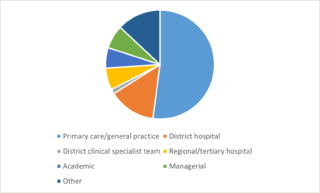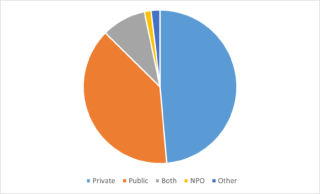Feedback: Survey of needs for continuing professional development
Published: 08/07/2021
Thanks to the 215 people that answered the questions in our survey about your needs for continuing professional development.
The following is a brief summary. Most respondents tor (49%), followed by the public sector (39%) (Figure 2).

Figure 1: Main field of practice (%)

Figure 2: Public and private sectors (%)
In Tables 1 and 2 the quantitative and qualitative feedback is combined. The quantitative feedback shows the proportion of respondents that selected each category of practice-related and clinical-related learning needs. The categories are presented in descending order in the Tables. The qualitative feedback (free text responses) was collated into topics and topics that received 10 or more entries were summarised. The summary of these selected topics is juxtaposed with the relevant quantitative category.
Table 1: Feedback on practice related learning needs (N=215)
| Practice related learning needs | Percentage | Main Comments |
|---|---|---|
| Improving the quality of care in my practice | 61 | Improving care through continuous cycles of quality improvement that focus on clear target standards within an innovative and learning practice environment. Handling simple analysis and statistics. |
| Responding to the needs of the population my practice serves | 53 | Few specific comments made. |
| Practising in an ethical and professional manner | 51 | Ensuring ethical practice and professionalism as well as knowledge of the relevant laws. Ethical decision making and handling dilemmas. Knowing the HPCSA ethical guidelines. Dealing with business issues, telehealth, POPI act. Avoiding litigation and dealing with medical errors. |
| Consulting and communicating with patients and their families | 45 | Improving doctor-patient communication skills in order to build an effective relationship based on trust, ethics and professionalism as well as being person-centred (empathy, expectations). Also communicating with families, adolescents and breaking bad news |
| Leading and managing my practice | 38 | Update and improve practice management, handling the administrative load, managing people, starting a new practice, keeping costs as low as possible for patients, coping in rural and small practices. |
| Building the capacity of people working in my practice team | 34 | Building the capability of junior and ancillary staff. Skills in teaching, training and mentoring. Inter-professional focus. Capacity building with limited time. |
Table 2: Feedback on clinical related learning needs (N=215)
| Clinical related learning needs | Percentage | Main Comments |
|---|---|---|
| Assessing and managing medical problems in adults | 69 | Managing diabetes according to latest guidelines, starting insulin, recognising and managing cardiovascular disease in people with diabetes, improving adherence to treatment and making use of the multidisciplinary team in review of the patient. |
| Promoting health and preventing diseases | 55 | Ability to promote health, lifestyle change and wellness in the consultation. Motivate change, stop cigarettes, increase physical activity, healthy diet, supported by simple and effective resources. |
| Assessing and managing emergency medical problems | 55 | Ability to manage emergencies in primary care, particularly in children, updated protocols, CPR, cardiac emergencies. |
| Assessing and managing medical problems in children | 52 | |
| Helping patients with palliative care | 41 | bility to counsel patients with palliative care issues, facing death, bereavement and grief. End of life care, DNRs and managing pain. Handling families. Cancer. Ethical issues. Building capacity in communities. |
| Assessing and managing medical problems in pregnant women | 34 | |
| Helping patients with impairments (rehabilitation) | 28 | Helping patients with impairments. Assessment of impairments. Specifically neurological problems, spinal injuries, stroke, cardiac rehabilitation and after orthopaedic surgery. Building teamwork between therapists and medical practitioners. |


![Family Physicians logo[transparent]](https://saafp.org/wp-content/uploads/2019/05/Family-Physicians-logotransparent-1200x266.png)